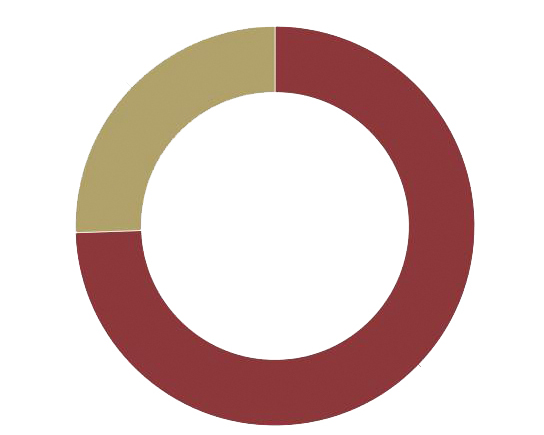Bake sale profits lead in fundraising efforts
Why bake sales tend to be more successful than other money raising campaigns.
March 10, 2016

The visual representation of money made at bake sales (red) versus other forms of fundraising (tan)
Bake sales dominate Blake community service fundraising. According to Lisa Sackreiter, Service Learning Coordinator, bake sales are responsible for $2,625 of the total $3,525 raised for service, or around 75%. The other $900 came from a $600 matching donation (to a bake sale’s $600) and a fundraiser selling water bottles and rafiki bracelets at Homecoming that generated $300.
Chris Chang ’19, a self-described “avid fan of bake sales” says “I think [bake sales] are good and are a good way to give money to other organizations and food to kids… Bake sales are cheap and people want to buy sweet food. I don’t know if there are any better ways to incentivize donations for high schoolers.”
Traditionally, bake sales will be set up at the bench next to the stairs in the senior lounge, vending a whole litany of baked goods that range from brownies to iced and sprinkled cookies. The causes that the bake sales represent also vary: funds have been raised for causes including supporting families facing cancer, helping victims of the Nepalese Earthquake in 2015, and ameliorating clean water sources in India.
Maria Orlandi ’16, a leader of Free the Children, a prominent service club that often holds bake sales and other fundraising events, says that “bake sales or fundraiser[s] where you’re selling a product of some sort like water bottles or t-shirts are the most reliable way to raise money from Blake students.”
A recently successful philanthropic endeavor was conducted by Jack Moe ’18 and Sam Shapiro ’18 when they conducted a bake sale at both the Upper and Middle schools to raise over $500 for the cause of supporting a Haitian basketball program. The money will go to buying some of the necessary gear for Haitian basketball players.
In regards to the actual success of the bake sale, Moe had something to say about the generosity of Blake students, too: “People were so generous that while we only sold five out of the six cartons of cupcakes, we raised more money than if we had just sold six cartons due to other donations that people made.”
Both Moe and Orlandi commented on the high frequency of bake sales, with both praising their ease to plan and surefire profits, but both also mentioned alternative ways to raise funds.
Specifically, Moe says, “We plan on having a fundraiser day where games like knocker ball are available and we also plan on selling t-shirts showing the logo of our non-profit in the making, Sprint to Cité Soleil.”
Orlandi elaborates, “Our other big method of raising money is our annual concert or spring event. This is definitely more exciting than doing a bake sale but it’s not as reliable because we really have to make sure that enough people will attend in order for it to be successful. Bake sales are low commitment and effort for students because there’s no planning in advance so I think that makes it much easier for [students] to participate. That’s the biggest obstacle with planning events like a concert, or the carnival that we’re doing this spring on May 7th. Getting students to make the commitment to come and participate is the hardest part.”
With the influx of community service groups this year, there has been a noticeable upswing in the amount of total bake sales at the Upper School. Orlandi comments, “it decreases the flexibility because we always have to be aware of the other events going on to make sure there’s not too many bake sales or fundraisers in a month.”
Moe says, “I think the most effective strategy is finding a topic that evokes emotion in people and finding something that evokes emotion in people because at the end of the day, any group can sell cupcakes, but people are going to buy more cupcakes if it’s a topic that they want to help out.